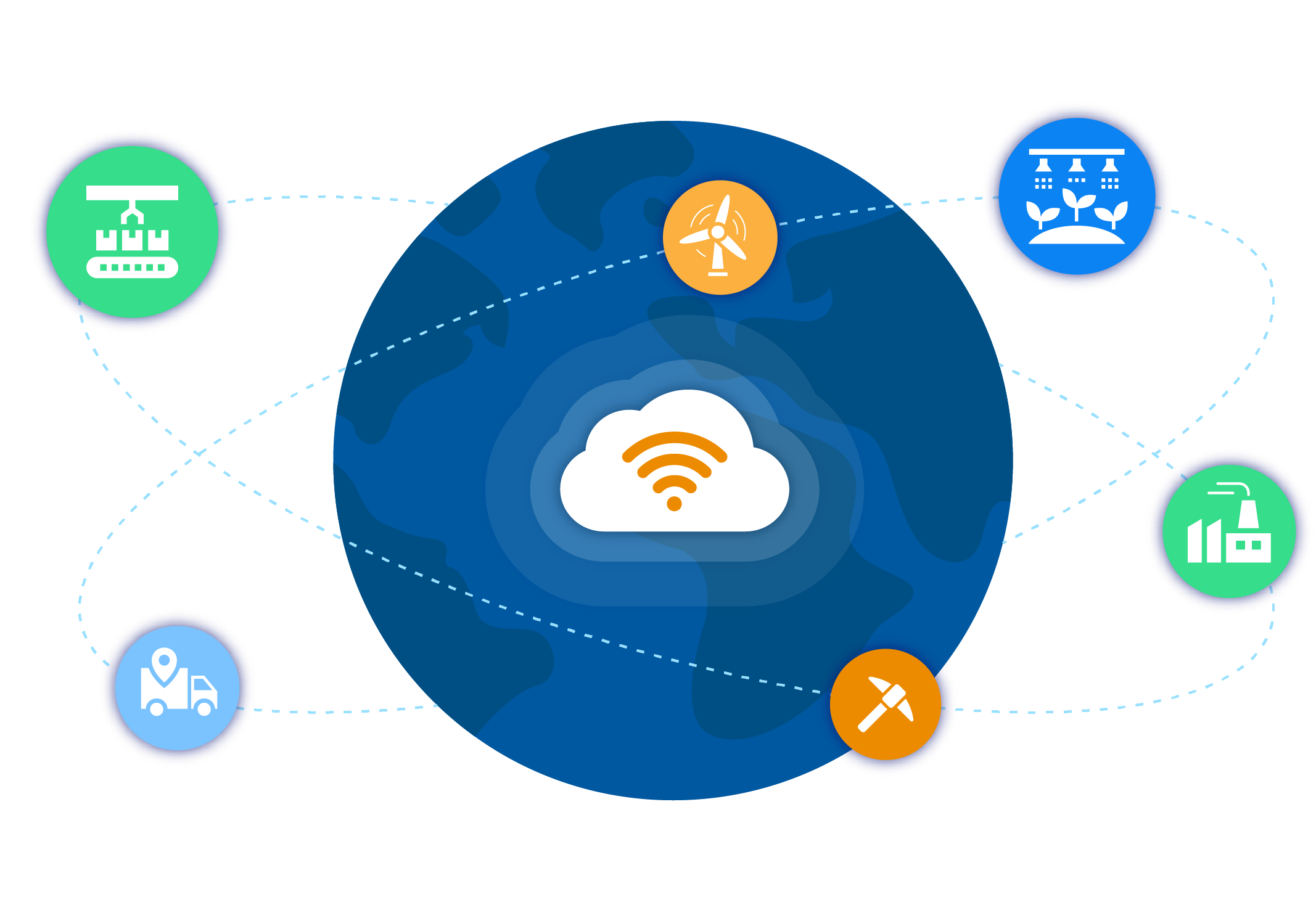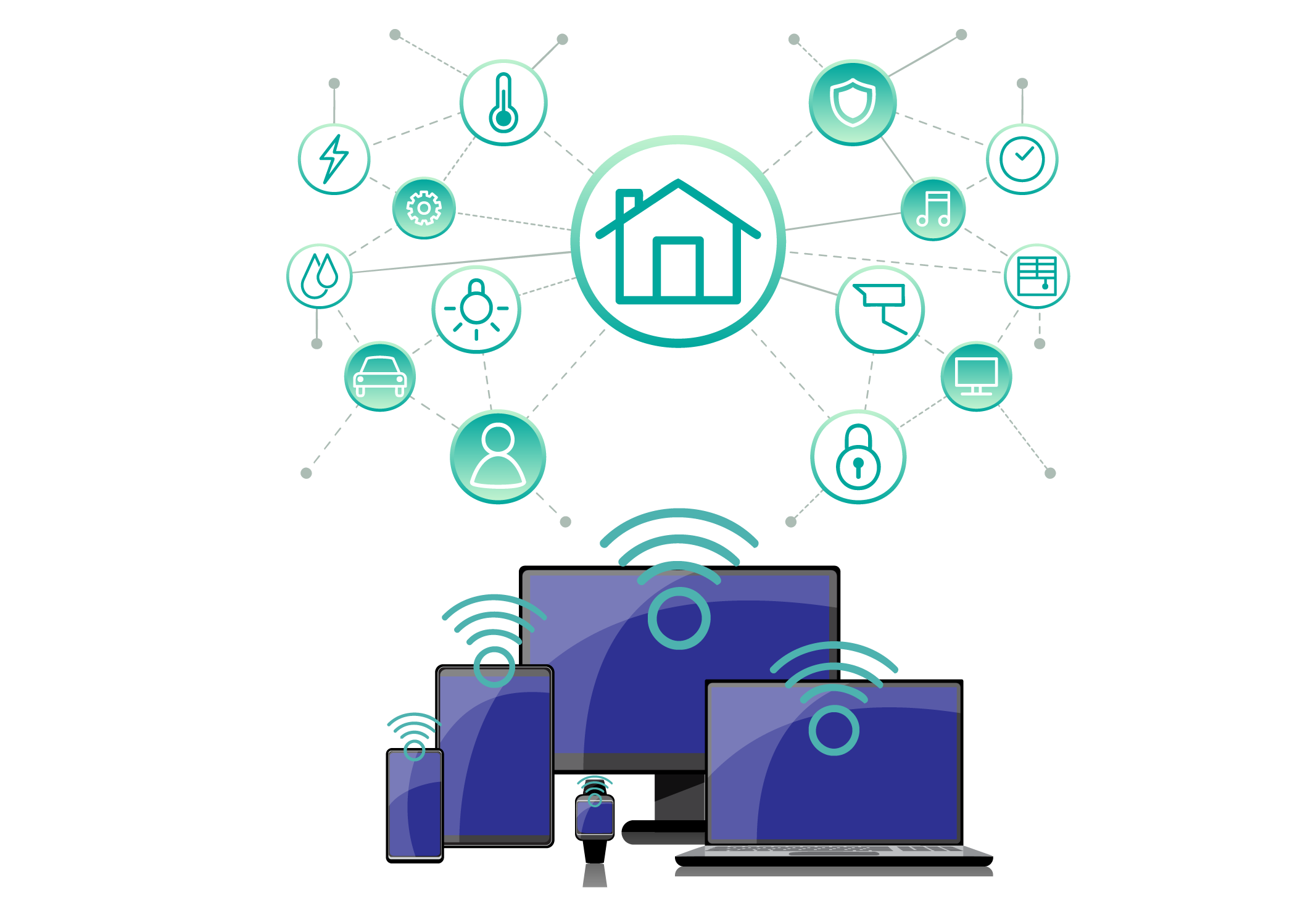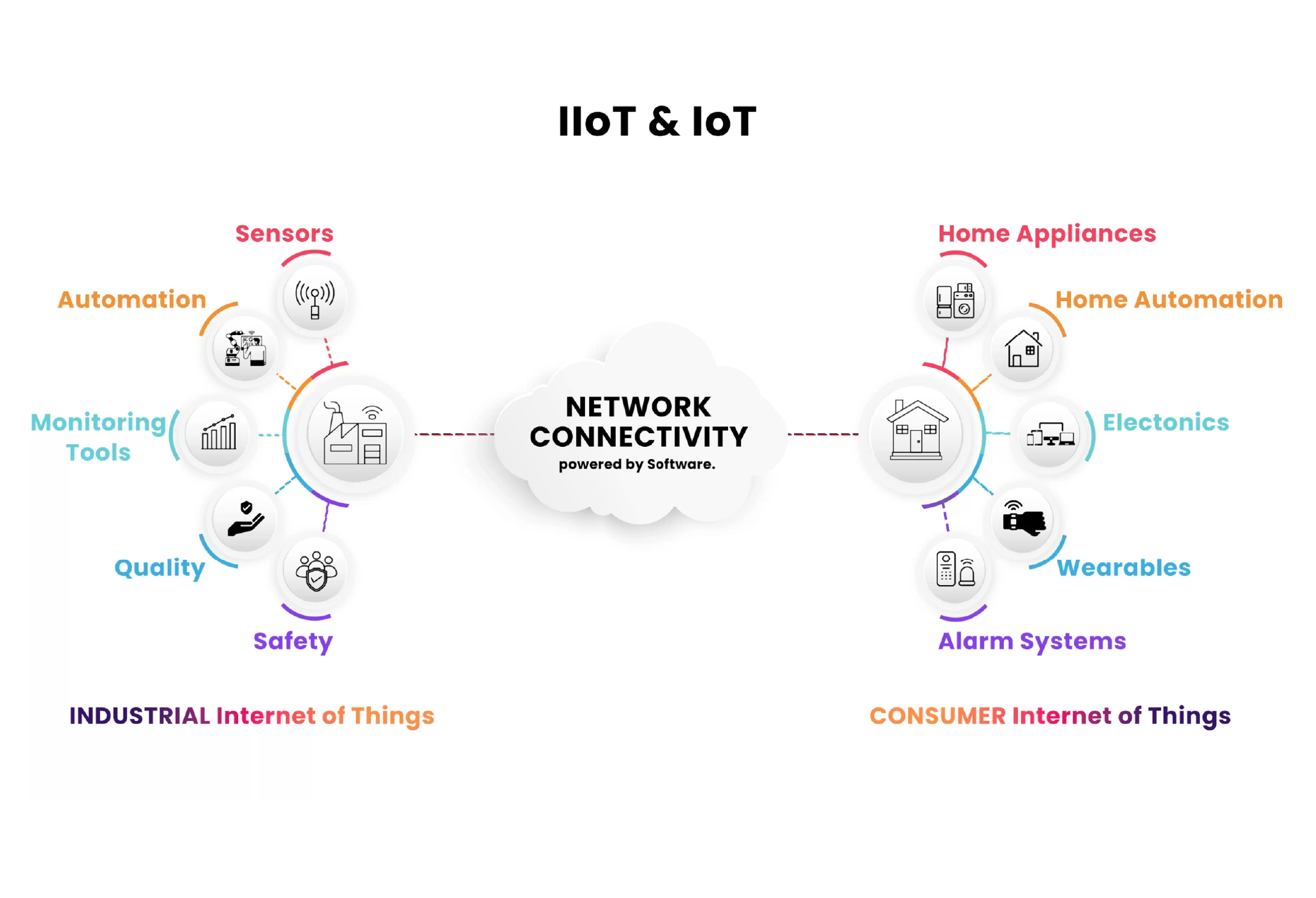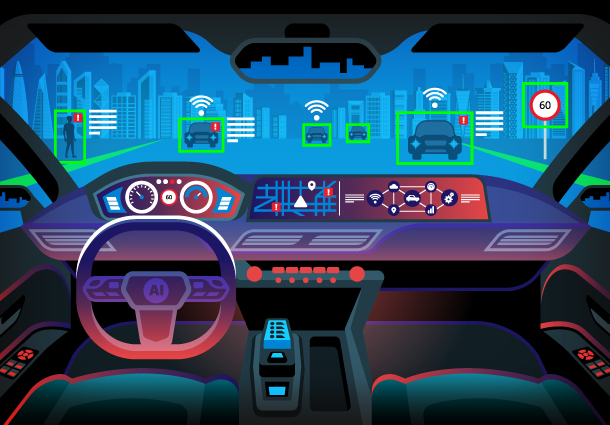Maritiming the Harmony of Sonnet with Industrial Internet of Things (IoT)
In today’s evolving landscape of the technology realm, the Industrial Internet of Things (IIOT) has evolved as a transformative force that is growing rapidly, and reshaping industries globally. With several interconnected devices and instant data analytics, industrial IOT offers the potential to boost efficiency and productivity.

Furthermore, IIoT represents the mixture of traditional industrial methods with modern digital technologies. By embedding sensors, and internet connectivity to machines and equipment, businesses gain new insights into how operations run. This method helps businesses to make informed decisions, streamline workflows, and keep developing over time. The capability of IIoT isn’t just limited to one industry but also spans a vast sector like manufacturing, healthcare, logistics, and many more.
In this comprehensive blog, we will delve into the future of industrial IoT and its key benefits to industries. We will also look into some real-time case studies, trends, and the nuances between IoT and IIot as well. So let’s deep dive into the insightful topic to understand the potential of IIot and how businesses can leverage this technology to stay ahead in the atmosphere of a competitive global marketplace.
Elevating the Landscape of Industries with the Artistry of IoT
Industrial IoT is a realm of devices, sensors, and applications with networking equipment that collectively work together to collect, analyze, and monitor data from industrial sector operations. This analysis facilitates the increase in visibility and maintenance of the capabilities. Unlike IoT which aims to focus on smart homes and other personal gadgets, IIOT is crafted for industrial applications like manufacturing, transportation, agriculture, and healthcare.

IIoT devices are embedded with sensors that gather information like real-time data from various operational processes, enabling a complete analysis of the data. This data is then transmitted over different types of networks which include local area network (LAN), and wide area network (WAN). Moreover, advanced analytic techniques such as machine learning and artificial intelligence, provide IIoT predictive maintenance, making sure everything operates smoothly. This helps companies to improve their reliability and spend less money by avoiding a breakdown.
Disentangling the Symphony between the IoT and IIOT; A Ballet of Intricacies
The Internet of Things and IoT are both on the same page- which means they have many technologies in common which include, cloud platforms, sensors, connectivity, and data- analytics that serve different purposes. However, the nuances of IoT and IoT lie in their distinct applications and environments. In IoT, the systems connect the devices across multiple verses such as healthcare, enterprise, utilities, and consumers. IoT technology consists of smart devices, personal gadgets, and other applications which aim to enhance convenience, and connectivity in everyday life.
Besides, industrial IoT focuses on optimizing industrial processes and machinery across sectors like manufacturing, energy, transportation, agriculture, and healthcare. It integrates sensors, devices, and machines within industrial settings to collect and analyze data for various purposes such as predictive maintenance, process optimization, and quality control. Unlike IoT, which primarily serves consumer needs, IIoT aims to improve operational efficiency, productivity, and safety in industrial environments.

IoT devices are curated in a way to enhances the user’s comfort zone and convenience, such as monitoring fitness levels, accessing smart locks remotely, and so on. On the other hand, industrial IoT is positioned in the industrial sector to monitor and optimize production lines and ensure guidelines with safety regulations. The installment of IIot solutions requires a citified technology like machine learning and artificial intelligence to examine vast amounts of data generated by industrial equipment. By implementing this data, IIot helps to predict when machines need maintenance, monitor them in real time, and make smarter decisions to save money, make operations more reliable, and use resources better in industries.
Overall, both IoT and industrial Internet of Things are involved in connecting devices and clout data for various purposes- IoT is focused on consumer-oriented applications for day-to-day life, whereas IIoT is tailored to industrial areas to enhance efficiency, reliability, and performance across diverse sectors.
Benchmarking the Benefits of Industrial Internet of Things
IIoT offers a plethora of benefits for transforming the industry’s sectors. To begin with, the industrial Internet of Things enables predictive maintenance by using real-time data from sensors to prognosticate any equipment issues before they occur. In addition, IIoT technologies help field technicians to analyze the issues before they turn out to be major ones, enabling technicians to fix an issue before they disturb customers. This also provides techs to understand the area of improvement when making a service call.
Moreover, IToT facilitates an asset management system to track down the location, status, and condition of their respective products throughout the supply chain. The system circulates immediate alerts to the stakeholders if the product is at risk of being damaged or already damaged, enabling them to take preventive action against the situation. IIoT also empowers intelligent decision-making through advanced analytics techniques such as machine learning and artificial intelligence. By analyzing vast amounts of data generated by IoT sensors, industries can gain valuable insights into their operations, optimize resource utilization, and identify new revenue streams. In addition, IIoT enhances supply chain management by providing real-time visibility into inventory levels, production status, and logistics operations, which leads to overall improving efficiency, and enhancing customer satisfaction.
Industrial IoT also aids companies in saving money by knocking out the need for lavish third-party maintenance, closely monitoring equipment performance, and facilitating remote analysis. Also, security-wise, IIoT necessitates substantial cybersecurity measures to protect sensitive data and critical infrastructure from cyber threats.
Unlocking the Boundless Innovation of IIoT Across Various Industries
Several industries are implementing Industrial Internet of Things (IIoT) technology to improve efficiency, productivity, and safety. IIoT is used in the automotive industry, to enable sensors to monitor the various components such as engines, brakes, and tires and predict potential failure before it occurs. IIot also enables real-time monitoring of vehicle systems, allowing manufacturers to remotely access the health and performance of the vehicle. Furthermore, IoT technologies play a vital role in vehicle safety features such as object recognition, lane detection, automatic braking systems, etc. reducing accidents and making vehicles safer for everyone. Moreover, integrated IoT sensors help to connect cars, and enable vehicle-to-vehicle interaction. The Industrial Internet of Things also collects a massive amount of data at production sites. These data help car manufacturers to gain deeper insights into improving and optimizing the entire production process. Also, this enables the implementation of high safety standards and minimizes losses.
In the agriculture industry, IIoT sensors collect data on soil moisture levels, temperature, humidity, and nutrient content, which allows farmers to analyze the field conditions in real time. This data enables precise irrigation, fertilization, and optimizing crop yields while minimizing resource wastage. Furthermore, it also supports seed quality and examines crop growth at every stage. IIot enables agriculture drones to capture high-resolution images and gather data on crop health, plant density, and irrigation needs. It provides insight to farmers to identify the problem areas, take ardent measures, and enhance their farming practices. With industrial IoT devices, farmers can easily monitor the location and behavior of their livestock in real time. This information helps farmers detect the signs of illness, monitor feeding patterns, and optimize breeding programs, which results in better management of healthier animals and enhances productivity.
In the oil and gas industry, industrial IoT enables real-time monitoring and control of all aspects of operations. Sensors embedded in the equipment collect data like temperature, pressure, flow rates, and equipment performance, allowing operators to monitor operations remotely and respond effectively. Sometimes, the oil and gas industry faces the risk of accidents. By implementing real-time safety monitoring of environmental conditions, and detecting leaks to prevent fatal accidents. Thus detecting potential accidents in advance creates a safer atmosphere for other employees and reduces the downfall as well. Moreover, industrial IoT also promotes sustainability by detecting carbon footprint by detecting leaks, which improves energy efficiency, and ensures environmental compliance. Also, industrial IoT enables operators to optimize asset utilization and performance by analyzing data on production rates, energy consumption, and equipment efficiency. This data-driven approach allows for better resource allocation, improved production forecasting, and enhanced operational functions across the oil and gas industry.
Chronicles of Case Studies by Showcasing the Innovation of Industrial IoT
In the rapid digitalization world, the industrial internet of things has stood out as a transformative catalyst, in the era of the technology world. Through a tale of success stories of various companies utilizing IIot technology to enhance productivity and drive innovation across various niches of industries. Here are some case studies that have given a tangible benefit to the manufacturing environment.
Siemens is a global manufacturing company that integrated Industrial IoT to curate a smart factory. Industrial IoT devices enable the monitoring of real-time data, conducting in-depth analysis, and optimizing the process efficiently. This transformation has also improved production efficiency, reduced waste, and elevated manufacturing functionality.
General Electric or GE has implemented industrial IoT solutions in its factories to improve productivity and efficiency. By connecting machines and equipment to a centralized IIoT platform, GE monitors production processes in real-time, detects an irregularity, and identifies areas for optimization. It enables GE to streamline operations, reduce waste, and increase throughput, which results in significant cost savings and enhanced competitiveness.
Tracing a Journey of Industrial IoT Powered by Pattem Digital
In conclusion, the industrial internet thing stands out as a vital force that reshapes industries across the world. By integrating sensors, connectivity, and advanced analytics, IoT empowers businesses to enhance efficiency, productivity, and safety in various sectors including automotive, agriculture, and healthcare industries. Also by implementing industrial IoT, it gives real-time data insights, predictive maintenance, and intelligent decision-making capabilities, IIoT enables companies to streamline operations, optimize resource utilization, and drive cost reductions while ensuring compliance with safety standards and regulations.
Moreover, the implementation of IIoT technologies across diverse industries has led to tangible benefits and transformative outcomes. Case studies such as Siemens, Bosch, and General Electric highlight the impacts of IoT adoption, showcasing improvements in production efficiency, waste reduction, and overall functionality.
IoT development companies like Pattem Digital also subsidize the advancement of industrial IoT by offering crafted solutions that are oriented toward IoT technologies. From manufacturing to the transportation sector, we are here to empower you with cutting-edge IIot solutions. From seamless integration to personalized strategies, we’re dedicated to helping you harness the full potential of IIoT to drive growth and success.





